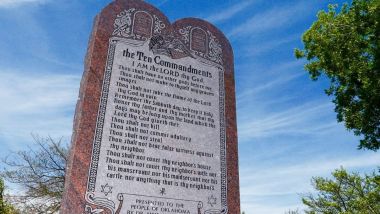Let voters decide on Ten Commandments monument, Oklahoma lawmakers say

Lawmakers in Oklahoma are taking the issue of the Ten Commandments monument directly to the public.
The lawmakers said they have filed a constitutional amendment and once this is approved they will let the voters decide on whether they want to keep the Ten Commandments monument on state Capitol grounds after the state Supreme Court ordered it removed.
House Joint Resolution 1036 has been filed for the second session of the legislature next year that directs the "Secretary of State to refer to the people for their approval or rejection the repeal of Section 5 of Article II of the Constitution of the State of Oklahoma; providing ballot title; and directing filing."
Section 5 of the state Constitution became the basis of the Oklahoma Supreme Court ruling that the monument should be removed.
It states that "no public money or property shall ever be appropriated, applied, donated, or used, directly or indirectly, for the use, benefit, or support of any sect, church, denomination, or system of religion, or for the use, benefit, or support of any priest, preacher, minister, or other religious teacher or dignitary, or sectarian institution as such."
"I see this as a battle that belongs to the great people of Oklahoma. It's up to them to determine what they want," said state Rep. John Paul Jordan, according to Fox News.
The ballot will ask voters if they want to repeal Section 5.
A 2010 poll showed that 80 percent of Oklahoma voters approved the installation of the monument.
Jordan earlier said that Section 5 is a "toxic provision" in the Constitution after the Supreme Court ruling.
"It was written with discrimination in mind, and like a malignant tumour, needs to be removed completely. I am under the opinion the court's strict interpretation of the language of Article 2, Section V could have far reaching implications," he said.
The case aiming to remove the monument was filed by the American Civil Liberties Union of Oklahoma on behalf of Baptist Minister Rev. Bruce Prescott and other citizens.
Jordan said the monument is common in the US and "a widely understood historic basis for our system of law."
But the American Civil Liberties Union of Oklahoma warned that even if the section is repealed, the monument can still be challenged.
"If the provision is repealed and the monument re-erected at the Capitol, it's likely the new monument will be challenged almost immediately under the United States Constitution," the ACLU Oklahoma posted on its website. "Such a challenge would have a significant probability of success at removing the new monument, though at the expense of a great deal more wasted tax dollars and unnecessary division and pain for Oklahomans on all sides of the debate."











